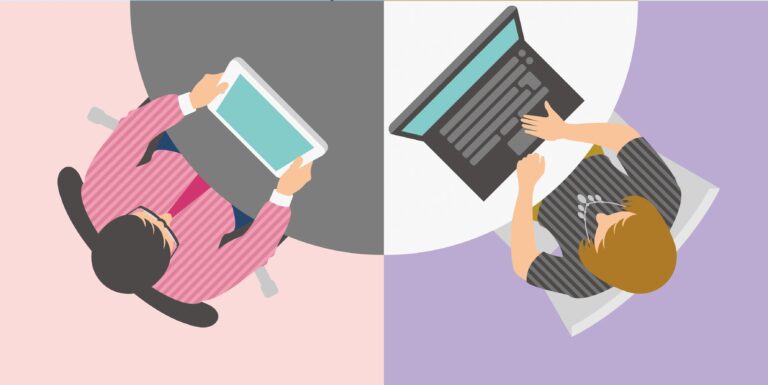
While looking into new devices to use at your workplace, you may be faced with the choice between buying a laptop and buying a tablet. Both can work very well in different settings, depending on what you are using them for. Sometimes, a tablet might work better for your intended use of the device, and sometimes a laptop might work better. Since both devices can be quite similar in functionality, the decision between the two can be tough. Here are some criteria that you may want to consider when choosing between a tablet and a laptop:
Portability
The vast majority of tablets will always be smaller than and weigh less than a laptop. Since tablets don’t have a separate keyboard and trackpad and generally have less hardware, they will almost always weigh less than their laptop counterparts. If you are someone that travels frequently, a tablet might be more convenient to carry around. Though, if you need your device to be more powerful and handle more complex tasks, a laptop can still act as a convenient, portable option. Also, if you prefer to have a physical keyboard rather than an on-screen keyboard, a laptop might be a better choice for you.
Storage
Due to their more compact size, tablets usually cannot support as much storage space as a laptop would be able to. If you want a tablet with higher storage capacity, you will inevitably need to pay more money. Depending on your needs, you may not be able to find a tablet with enough storage space at a price that works for you. Even budget laptops will generally have a higher storage capacity than most tablets.
Price
Although there is quite a bit of overlap between the prices of tablets and the prices of laptops, there is still a noticeable trend. Tablets are generally less expensive than laptops, but if you are only looking to buy one device, some people suggest that you buy a laptop since they can be more versatile. Essentially, a laptop might be able to do more than a tablet of the same price.
There are budget tablets that exist that cost $100 and below that are ideal for simple tasks. Mid-tier tablets may cost between $200-$400 and have slightly more capabilities. Higher-tier tablets will be $500 and above and will be able to offer the best performance. In comparison, the costs of budget laptops start at the same range as the mid-tier tablets, but their performance will be better. Mid-tier and top-tier laptops will cost quite a bit more than any tablets but will have a much greater performance.
Battery Life
Typically, tablets will have a longer battery life than a laptop will. Tablets tend to have lower power requirements of their hardware components and tend to have more space inside the device to hold a larger battery. Laptops, on the other hand, have more hardware components with more demanding power requirements, so the batteries are smaller relative to the size of the device. On average, laptops do not run as long as tablets. If you do not need the larger, more powerful hardware of a laptop, a tablet might be a good option for you.
Performance
Laptops will always be able to perform better than their tablet counterparts. Both devices will work just as well for simpler tasks like sending emails or browsing the web, but laptops will be able to perform more complex tasks where tablets won’t. On average, laptops will be able to offer high performing processors and are better suited for multitasking. Also, if you use special software for your work, a computer will probably be more compatible and capable of running it. Additionally, if you type frequently, a computer might be a better choice since it has a physical keyboard, though you can buy keyboard attachments for tablets if necessary. If you only need this device to perform basic, simple tasks, a tablet might be a better option.
Software
Like your phone, tablets use mobile operating systems like Apple iOS or ChromeOS. This means that many software programs that you might need to use will not be compatible with your device. On the other hand, most laptop operating systems will be compatible with most of the software programs that you might need to use, with a few exceptions. Also, tablets cannot be remotely connected to, so if that technology is something you use often, you may want to choose a laptop instead of a tablet.
There are convertible, 2-in-1 laptops that exist now that can act as both a laptop and a tablet. Many are foldable, meaning that the keyboard can be folded forward to make the device laptop-shaped and backward to make it tablet-shaped. These devices will have touchscreens and usually cameras, just like tablets, but will also have the hardware and versatility of a laptop. They will also have a computer-based operating system rather than a mobile OS like most tablets. Sometimes convertible laptops allow you to detach the keyboard when not in use to get rid of the extra weight. To some, this device can provide the best of both worlds. They are typically more expensive than traditional laptops, but can be a perfect fit for some people and some tasks, so well worth the investment in those situations.
Read our previous post here: RockYou2024: Billions of Passwords Leaked
